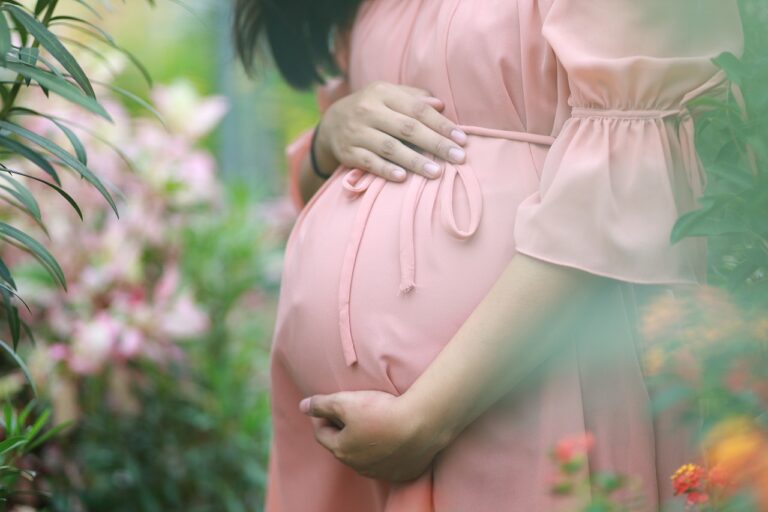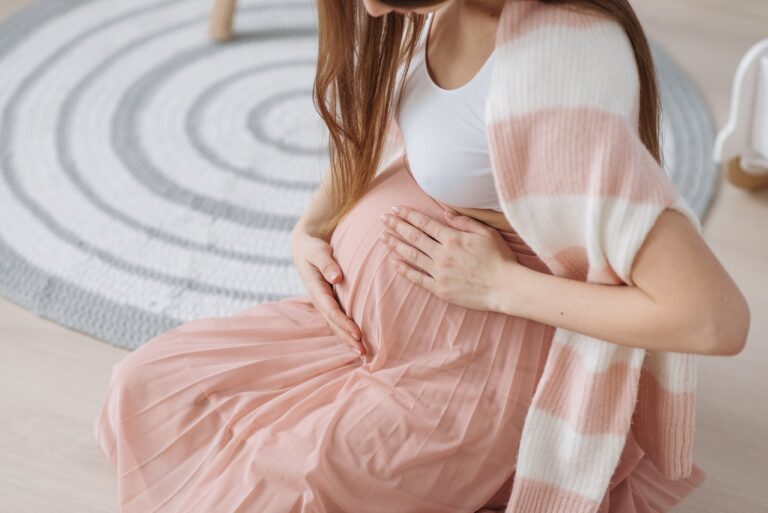Is it safe to touch your belly button while pregnant? Exploring the facts
During pregnancy, the body undergoes numerous changes as it nurtures and grows a new life. One area that experiences significant transformation is the belly button. Understanding these changes and their implications is important for expectant mothers. Here is a breakdown of what happens to the belly button during pregnancy.
The belly button, also known as the navel or umbilicus, is the remnant of the umbilical cord that connected the fetus to the mother’s placenta. It is a small, hollow depression located at the center of the abdomen.
As pregnancy progresses, the belly button undergoes changes due to the growing uterus and expanding abdomen. Some common changes include stretching and excessive pressure on the belly button, as well as a higher risk of developing an umbilical hernia.
1. Stretching and Excessive Pressure: The growing uterus puts pressure on the abdominal wall, causing it to stretch. This stretching can lead to the protrusion or “popping out” of the belly button.
2. Risk of Umbilical Hernia: The increased pressure on the abdominal muscles can weaken the area around the belly button, making it more susceptible to the development of an umbilical hernia. This occurs when part of the intestine or fatty tissue pushes through the weakened abdominal wall, resulting in a bulge near the belly button.
Some pregnant women instinctively touch or rub their belly button during pregnancy. This behavior serves various purposes and can provide comfort and connection during this transformative time.
1. Relieving Itching and Discomfort: Pregnancy hormones can sometimes cause itching and discomfort around the belly button area. Gentle touching or rubbing may provide temporary relief from these sensations.
2. Bonding and Connecting with the Baby: Touching the belly button can create a physical and emotional connection between the mother and her growing baby. It allows the mother to feel her baby’s movements and respond to them.
3. Seeking Emotional Comfort: Pregnancy is a time of heightened emotions, and touching the belly button can serve as a source of emotional comfort for some expectant mothers. It can provide a sense of security and connection to the little one inside.
Touching the belly button during pregnancy is generally safe, but it is essential to take certain precautions to ensure the well-being of both the mother and the baby.
1. Maintain Good Hygiene: Clean the belly button area regularly to prevent the buildup of dirt and bacteria, which can cause infections.
2. Avoid Applying Excessive Pressure: Be gentle when touching or rubbing the belly button to avoid any unnecessary pressure or discomfort for the baby.
Concerns may arise regarding whether touching the belly button could harm the baby. Rest assured, gentle touching or rubbing of the belly button is unlikely to cause any harm. However, if you have any concerns or experience unusual symptoms, it is best to consult your healthcare provider for guidance.
If touching the belly button doesn’t feel comfortable or if you’re looking for alternative ways to connect with your baby during pregnancy, there are other options to consider:
1. Talking and Singing to the Baby: Engage in regular conversations or sing songs to your baby. Your voice can be soothing and help establish a bond.
2. Gentle Massages and Belly Rubs: Lightly massaging or rubbing the belly can provide relaxation and promote a sense of connection between you and your baby.
3. Playing Music for the Baby: Play soft and calming music to create a soothing atmosphere for both yourself and your baby.
Remember, every pregnancy journey is unique, and it’s important to listen to your body and do what feels right for you. Taking the time to nurture and connect with your baby can be a beautiful and rewarding experience.
Key Takeaways:
- Changes in the belly button during pregnancy can include stretching and excessive pressure, as well as a risk of developing an umbilical hernia.
- Pregnant women may touch their belly button to relieve itching and discomfort, bond and connect with the baby, and seek emotional comfort.
- As long as proper hygiene is maintained and excessive pressure is avoided, touching the belly button during pregnancy is generally safe and unlikely to harm the baby.
What Is the Belly Button?
The belly button, also known as the navel, is a scar left behind after the umbilical cord is cut at birth. What Is the Belly Button? It is located in the center of the abdomen, about halfway between the chest and the pelvis. The belly button is a remnant of our time in the womb, where the umbilical cord connected us to our mother’s placenta. It serves no biological function after birth but is a unique feature that varies in appearance from person to person. The belly button is a fascinating part of the human body and holds symbolic and cultural significance in many societies.
Changes in the Belly Button During Pregnancy
During pregnancy, our bodies undergo incredible transformations, and one area that experiences noticeable changes is our belly button. As our little one grows, the expanding belly exerts pressure on the abdomen, causing our belly buttons to stretch and sometimes lead to discomfort. There’s a risk of umbilical hernia development. Let’s dive deeper into these sub-sections to understand the effects of stretching, excessive pressure, and potential complications during this miraculous journey.
1. Stretching and Excessive Pressure
During pregnancy, the belly button undergoes stretching and experiences excessive pressure due to the expanding uterus. This can lead to changes in the appearance and sensation of the belly button. To address this, there are steps that pregnant women can take:
- Keep the belly button area clean and dry to prevent any infections.
- Avoid applying excessive pressure or pulling on the belly button to minimize discomfort caused by stretching and excessive pressure.
- Wear loose-fitting and comfortable clothing to reduce further stretching and pressure on the belly button area.
- Consider using belly bands or support garments to provide additional support and alleviate discomfort caused by stretching and excessive pressure.
One interesting historical fact is that belly button piercing has been practiced for thousands of years and can be traced back to ancient Egypt, where it was seen as a symbol of fertility and beauty. Today, many pregnant women choose to remove their belly button rings to accommodate the changes in their belly button during pregnancy.
2. Risk of Umbilical Hernia
The risk of umbilical hernia during pregnancy is a common concern. Here are some important factors to consider:
For more information on touching your belly button while pregnant, you can visit the Touching belly button while pregnant article on What to Expect.
- Increased Pressure: One factor that increases the risk of umbilical hernia is the growing uterus exerting pressure on the abdomen. This pressure can cause the belly button to protrude.
- Past Women who have previously had an umbilical hernia are at a higher risk of developing one during pregnancy.
- Multiples Pregnancy: If you are carrying multiples, the risk of umbilical hernia can be further increased due to the additional pressure on the abdomen.
- Preventive Measures: Taking preventive measures can help reduce the risk of umbilical hernia. These include maintaining good posture, avoiding heavy lifting, and providing support to the belly with a maternity belt.
- Consultation: It is crucial to consult a healthcare provider if you experience any pain, discomfort, or bulging near the belly button. They can evaluate the situation properly and provide guidance.
Why Do Some Pregnant Women Touch their Belly Button?
Pregnancy is a journey filled with fascinating behaviors and traditions, and one curious phenomenon that often catches our attention is when pregnant women touch their belly buttons. In this section, we unravel the reasons behind this intriguing behavior. From relieving itching and discomfort to bonding with the baby and seeking emotional comfort, each sub-section explores the multifaceted reasons why pregnant women instinctively reach for their belly buttons. Prepare to delve into the captivating world of belly button touchpoints during pregnancy.
1. Relieving Itching and Discomfort
Relieving itching and discomfort is a common reason why expectant mothers touch their belly button. As the abdomen expands, the skin around the belly button can stretch and become itchy, resulting in discomfort. Gently rubbing or touching the belly button can offer temporary relief from the itching and discomfort. It is important to remember that while touching the belly button can bring relief, excessive pressure should be avoided to prevent any harm to the baby. Maintaining good hygiene is also crucial in order to prevent any infections. Fun Fact: The belly button is the scar left behind after the umbilical cord is cut at birth.
2. Bonding and Connecting with the Baby
Bonding and connecting with the baby during pregnancy is a special experience for expectant mothers. It helps create a strong emotional attachment with the little one growing inside. Here are some steps to bond and connect with the baby:
- Talking and singing to the baby: Engaging in conversations and singing stimulates the baby’s hearing and helps establish a connection.
- Gentle massages and belly rubs: Massaging the belly gently can provide comfort to both the mother and the baby, and promote relaxation.
- Playing music for the baby: Playing soothing music or lullabies can have a calming effect on the baby and enhance the bonding process.
Sarah, an expectant mother, found that whenever she played her favorite songs to her baby, the baby would respond with gentle kicks. This led to a beautiful bonding experience between mother and child even before they met face to face. Bonding and connecting with your baby during pregnancy is a unique and cherished time that builds a strong foundation for the future relationship.
3. Seeking Emotional Comfort
To seek emotional comfort during pregnancy, there are various methods that can be employed. These methods aim to promote relaxation and establish a strong connection with the baby. Here are some steps that can be taken in order to seek emotional comfort during pregnancy:
- Practice deep breathing and meditation techniques: These techniques can help calm the mind and reduce stress levels.
- Engage in activities that promote self-care and self-love: Activities like taking warm baths or practicing gentle prenatal yoga can provide emotional comfort.
- Seek support from loved ones, friends, or support groups: Sharing feelings and concerns with trusted individuals can greatly contribute to emotional well-being during pregnancy.
- Write in a journal: Maintaining a journal provides an outlet to express emotions and reflect on the journey of pregnancy.
- Listen to calming music or sounds: Creating a soothing environment with calming music or sounds can help foster emotional comfort.
By following these steps, expectant mothers can find emotional comfort and establish a deep connection while experiencing the beautiful journey of pregnancy.
Is Touching the Belly Button Safe during Pregnancy?
Is touching the belly button safe during pregnancy?
Touching the belly button during pregnancy is generally safe, but it may cause discomfort or sensitivity for some women. There is no medical reason to avoid touching the belly button, but it’s important to listen to your body and stop if it feels uncomfortable. The belly button area may become more sensitive as the abdomen expands and the skin stretches. It’s always a good idea to consult with your healthcare provider if you have any concerns about touching your belly button or any other aspects of pregnancy.
Precautions to Take While Touching the Belly Button During Pregnancy
During pregnancy, taking care of your belly button is of utmost importance. In this section, we will explore essential precautions to keep in mind while touching your belly button. From maintaining good hygiene to avoiding excessive pressure, we’ll uncover practical tips and insights to ensure the well-being of both you and your baby. So, let’s dive in and discover how to take proactive steps in nurturing your belly button during this special time in your life.
1. Maintain Good Hygiene
Maintaining good hygiene of the belly button is crucial during pregnancy to prevent infections and complications. Here are some important tips to follow:
- Remember to maintain good hygiene by gently washing the area with mild soap and water to keep it clean and dry.
- Avoid using harsh chemicals or perfumed products on the belly button as they can irritate the skin and lead to unwanted complications.
- After cleansing, make sure to pat dry the area thoroughly to prevent moisture buildup.
- To reduce the risk of introducing bacteria, it’s important to refrain from touching or picking at the belly button.
- If you observe any redness, swelling, or discharge from the belly button, it’s advisable to consult your healthcare provider for proper evaluation and treatment.
By following these hygiene practices, you can ensure the health and well-being of both you and your baby during pregnancy.
2. Avoid Applying Excessive Pressure
- Avoid applying excessive pressure: When touching or cleaning your belly button, make sure not to put too much pressure on it to avoid irritation or injury.
- Use mild products: Opt for gentle cleansers or mild soap to clean your belly button, ensuring that there are no harsh reactions.
- Avoid tight clothing: Opt for loose-fitting and comfortable clothing instead of wearing tight clothes, as they can put pressure on the belly button area and cause discomfort.
- Watch your posture: Maintain good posture to prevent unnecessary strain on the region of your belly button.
- Consult your healthcare provider: If you experience any pain or discomfort in the area of your belly button, seek medical advice for further guidance and support.
Can Touching the Belly Button Harm the Baby?
Can Touching the Belly Button Harm the Baby?
Touching the belly button during pregnancy does not pose any harm to the baby. The belly button, or umbilicus, is a scar on the abdomen that forms after the umbilical cord is cut. It is a non-sensitive part of the body and does not have any direct connection to the baby. It is always important to practice gentle touches and avoid putting pressure on the abdomen to ensure the comfort and safety of the mother and baby. If you have any concerns about belly button touching during pregnancy, it is advisable to consult with a healthcare professional.
Alternative Ways to Connect with the Baby During Pregnancy
During pregnancy, there are alternative ways to forge a deeper bond with your baby. From talking and singing to your little one, to indulging in gentle massages and belly rubs, or even playing soothing music, exploring these methods can enhance your connection with the tiny life growing within you. So, let’s discover the beautiful ways you can nurture that special bond throughout your pregnancy journey.
1. Talking and Singing to the Baby
Talking and singing to the baby during pregnancy is a marvelous way to bond and connect with them. It helps foster a sense of familiarity and comfort for both the mother and the baby. Here are some suggestions for integrating this practice into your pregnancy:
- Allocate dedicated time each day to engage in conversation and serenade your baby.
- Share your thoughts, dreams, and hopes with your precious baby.
- Read books or poetry to your baby, allowing them to detect various rhythms and tones of your voice.
- Play gentle, soothing music and sing lullabies to promote calmness and relaxation for both you and your baby.
- Participate in dialogues with your baby, asking them questions or recounting stories of your day.
Talking and singing to your baby not only strengthens the bond between you, but it also nurtures their development and aids in the recognition of your voice once they enter the world. Cherish this special time of connection with your little one.
2. Gentle Massages and Belly Rubs
Gentle massages and belly rubs during pregnancy can provide various benefits and enhance the bonding experience with the baby.
- Promote relaxation and reduce stress levels for both the mother and the baby.
- Relieve muscle tension and discomfort in the abdominal area.
- Improve blood circulation and lymphatic flow, reducing swelling and promoting overall well-being.
- Enhance the mother’s awareness of the baby’s movements and position.
Pro-tip: Incorporate gentle massages and belly rubs by using natural oils or lotions specifically formulated for pregnancy massages, and always consult with a prenatal massage therapist to ensure safe and effective techniques. These gentle touches can create a beautiful connection between the mother and the baby.
3. Playing Music for the Baby
- Playing soft and gentle music for the baby during pregnancy can have a soothing and calming effect, and it is a way to bond with the little one before birth. Here are some steps to follow:
- Choose calming tunes or classical music to create a serene environment for the baby.
- Position headphones or speakers gently on your belly to allow the baby to hear the music clearly.
- Set aside dedicated time each day to play music for your baby to establish a routine.
- Pay attention to any movements or kicks that occur in response to the music. It’s a sign that the baby is enjoying the experience!
- Explore various genres of music and see which ones elicit the most positive reactions from the baby.
Interestingly, studies suggest that babies may remember and respond to the music played during pregnancy even after they are born. Providing a gentle and harmonious environment through music can contribute to the baby’s overall well-being.
Frequently Asked Questions
Can touching my belly button while pregnant harm the baby?
No, touching your belly button while pregnant will not harm the baby. The baby is well cushioned in the womb by amniotic fluid, the uterus, and the mother’s skin and belly fat.
When can the baby feel me poking my belly?
The baby can feel the mother poking and moving before the mother can feel the baby, usually around 18 to 20 weeks of pregnancy.
Why do pregnant women touch their baby bumps?
Pregnant women often touch their baby bumps as a way to feel close to their baby and find it soothing. Touch is the first sense that babies develop in the womb, even before sight and hearing.
Do babies respond to belly rubs during pregnancy?
Yes, babies respond positively to pregnant belly rubs. Research has shown that babies moved their arms, heads, and mouths more when their mothers touched their bellies compared to when they spoke to them. Babies usually start responding to maternal touch between weeks 21 and 25 of pregnancy.
What are some other ways to bond with the baby during pregnancy?
Other ways to bond with the baby during pregnancy include playing music, talking to the baby, reading to the baby, and keeping a journal. These activities can help form an attachment and instill a love of language in the baby.
Will my belly button return to normal after pregnancy?
After pregnancy, the belly button will usually return to its normal position within a few months, although it may appear stretched out or “lived in.” This is a normal part of the postpartum body and should be worn proudly.










